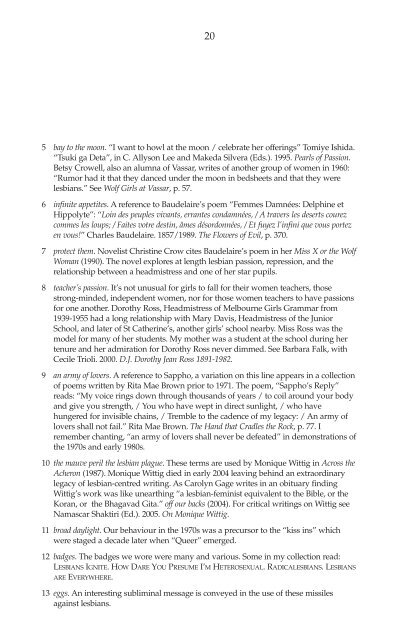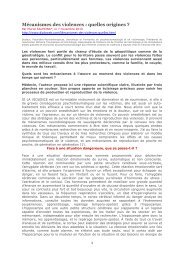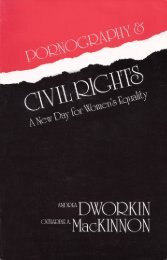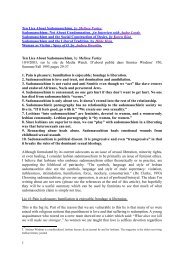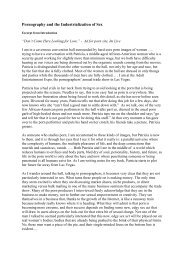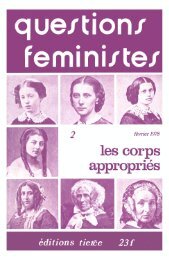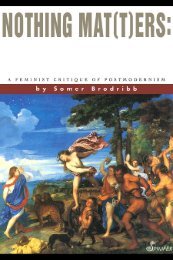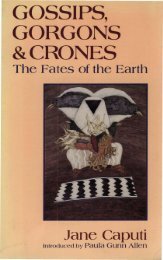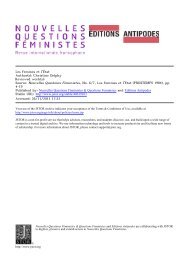Butterfly Effect - ressourcesfeministes
Butterfly Effect - ressourcesfeministes
Butterfly Effect - ressourcesfeministes
You also want an ePaper? Increase the reach of your titles
YUMPU automatically turns print PDFs into web optimized ePapers that Google loves.
20<br />
5 bay to the moon. “I want to howl at the moon / celebrate her offerings” Tomiye Ishida.<br />
“Tsuki ga Deta”, in C. Allyson Lee and Makeda Silvera (Eds.). 1995. Pearls of Passion.<br />
Betsy Crowell, also an alumna of Vassar, writes of another group of women in 1960:<br />
“Rumor had it that they danced under the moon in bedsheets and that they were<br />
lesbians.” See Wolf Girls at Vassar, p. 57.<br />
6 infinite appetites. A reference to Baudelaire’s poem “Femmes Damnées: Delphine et<br />
Hippolyte”: “Loin des peuples vivants, errantes condamnées, / A travers les deserts courez<br />
commes les loups; / Faites votre destin, âmes désordonnées, / Et fuyez l’infini que vous portez<br />
en vous!” Charles Baudelaire. 1857/1989. The Flowers of Evil, p. 370.<br />
7 protect them. Novelist Christine Crow cites Baudelaire’s poem in her Miss X or the Wolf<br />
Woman (1990). The novel explores at length lesbian passion, repression, and the<br />
relationship between a headmistress and one of her star pupils.<br />
8 teacher’s passion. It’s not unusual for girls to fall for their women teachers, those<br />
strong-minded, independent women, nor for those women teachers to have passions<br />
for one another. Dorothy Ross, Headmistress of Melbourne Girls Grammar from<br />
1939-1955 had a long relationship with Mary Davis, Headmistress of the Junior<br />
School, and later of St Catherine’s, another girls’ school nearby. Miss Ross was the<br />
model for many of her students. My mother was a student at the school during her<br />
tenure and her admiration for Dorothy Ross never dimmed. See Barbara Falk, with<br />
Cecile Trioli. 2000. D.J. Dorothy Jean Ross 1891-1982.<br />
9 an army of lovers. A reference to Sappho, a variation on this line appears in a collection<br />
of poems written by Rita Mae Brown prior to 1971. The poem, “Sappho’s Reply”<br />
reads: “My voice rings down through thousands of years / to coil around your body<br />
and give you strength, / You who have wept in direct sunlight, / who have<br />
hungered for invisible chains, / Tremble to the cadence of my legacy: / An army of<br />
lovers shall not fail.” Rita Mae Brown. The Hand that Cradles the Rock, p. 77. I<br />
remember chanting, “an army of lovers shall never be defeated” in demonstrations of<br />
the 1970s and early 1980s.<br />
10 the mauve peril the lesbian plague. These terms are used by Monique Wittig in Across the<br />
Acheron (1987). Monique Wittig died in early 2004 leaving behind an extraordinary<br />
legacy of lesbian-centred writing. As Carolyn Gage writes in an obituary finding<br />
Wittig’s work was like unearthing “a lesbian-feminist equivalent to the Bible, or the<br />
Koran, or the Bhagavad Gita.” off our backs (2004). For critical writings on Wittig see<br />
Namascar Shaktiri (Ed.). 2005. On Monique Wittig.<br />
11 broad daylight. Our behaviour in the 1970s was a precursor to the “kiss ins” which<br />
were staged a decade later when “Queer” emerged.<br />
12 badges. The badges we wore were many and various. Some in my collection read:<br />
LESBIANS IGNITE. HOW DARE YOU PRESUME I’M HETEROSEXUAL. RADICALESBIANS. LESBIANS<br />
ARE EVERYWHERE.<br />
13 eggs. An interesting subliminal message is conveyed in the use of these missiles<br />
against lesbians.


